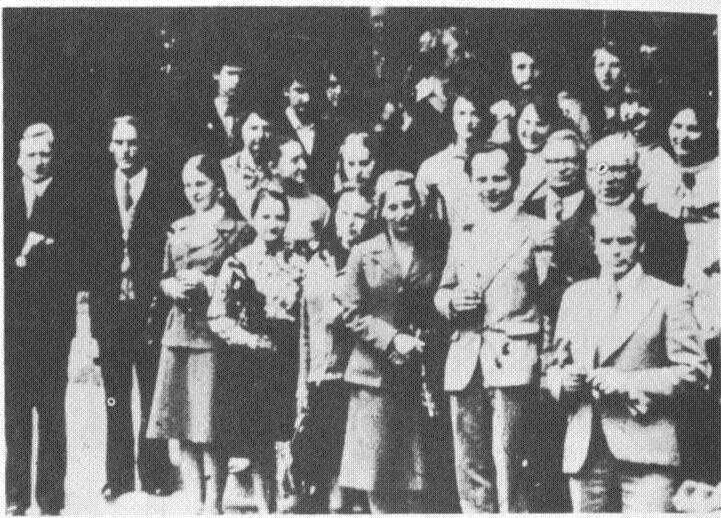Viktoras Petkus writes:
"On August 23, the sum of the years I have spent in prison will be a round and solid twenty. In the twenty years I have spent in houses of detention, I have never seen a fellow countryman who did not celebrate Christmas or Easter. Of course, at Christmas, we had no tree, but on the table we had a beautifully ornamented tree clipped from Horticulture magazine. I made slizikai from cut-up dried bagels, and there was a white plotkelė (Trans. Note — staples of the traditional Lithuanian Christmas Eve supper.) That way, everything seemed to be right. . . but for the first time, I don't know when Lent begins, or Easter occurs.
"Our life is monotonous. For us, receiving newspapers and and magazines is problematical. They claim that periodical literature reaches us three times a week. So they say; but in reality, weeks have gone by without our receiving a single newspaper. If they do deliver the newspapers, they usually bring the magazines only once a week, so that they make an armful. The rule here is that an individual prisoner can keep only five items in his cell, no matter whether books, brochures or magazines; everything else has to be checked with the store room, on the pretext that you can claim it when you want it.
"Theoretically, it looks like a pretty good system. In practice, it

This photograph, taken outside the court in Vilnius on the last day of Viktoras Petkus' trial in 1978, shows, first from left: Antanas Terleckas (currently in exile in Magadan), and third from right: Father Sigitas TamkevicUus, awaiting trial in Vilnius.
sometimes takes over a week to get them to take you to the store room. So you end up in a vicious circle. It's worse with books. Receiving any books from home is categorically forbidden. Book sellers are uninterested in sending us books on order, since they are often returned to the sender; that is, to the bookseller. Thus, in their eyes we become less than serious customers.
"The situation regarding letters is not enviable at all. The rules say that outgoing or incoming mail cannot be held up by the prison administration more than three days. In some prisons, those so-called three days used to stretch out, but still an effort was made to keep the rule. Here, they don't even mention such a regulation, as though it didn't even exist. Earlier, they at least used to inform us about some of the confiscated incoming mail; but now, they don't even do that. The relatives of some try writing letters via the local attorney general or the All-Union Attorney General. Occasionally a letter sent through these channels arrives.
"Not only did no one deliver any telegrams about money being sent, but they did not even tell me. About six times a week for lunch we eat soup made from frozen, rotten cabbage. To complaints that the cabbage is bad, officials reply, 'And where are we to get any other kind? Besides, the doctor says that you can still eat it. . . (Out here, people don't know how to pickle cabbage, so they keep it outside in the cold; that is, they freeze it. But this winter, we are having record high temperatures, with thaws. This is why the poor cabbage rots.)
"We are out in the fresh air no more than one hour in twenty-four; and even this hour our guards sometimes try to shorten, in order to spend as little time as possible cooling their heels while we take our walk. In other prisons, to prevent this, there are clocks hanging in the corridors. We asked for the same arrangement here, but they replied that for us, time has stopped. Nevertheless, later they did hang up a broken-down clock; but still later, they reconsidered and hid it away somewhere. There is not a single clock in the whole prison; and when you ask the guards what time it is, they don't tell you anything either, so that at work it's disorienting.
"Perhaps I've made this letter too long. I have to be concerned lest the letter, on account of its length, 'get hung up'. Many greetings and best wishes to all!"
This spring, (Mrs.) Elena Terleckienė went to visit her husband, the exile Antanas Terleckas, in the Far East, in the Region of Magadan. Arriving at his place of exile, Terleckienė immediately felt very uncomfortable — the place is well above sea level, and there is a shortage of oxygen. She found her husband very ill on account of the difficult living conditions. His feet were swollen and his health had significantly deteriorated.





